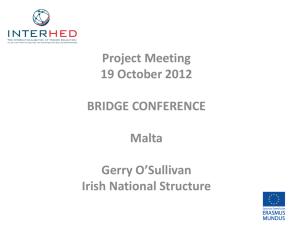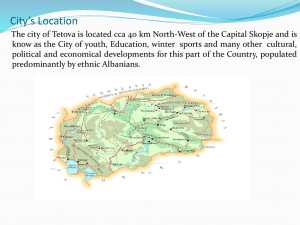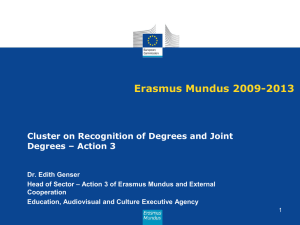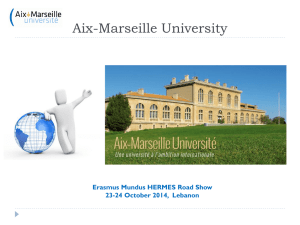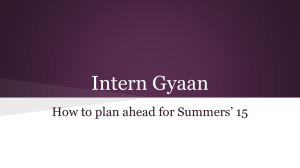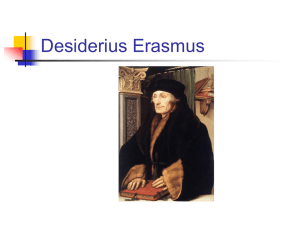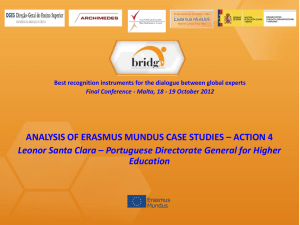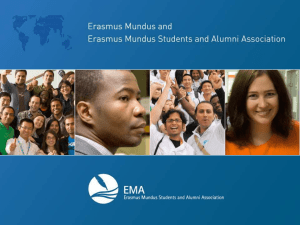Feel free to use it - Erasmus Mundus Students and Alumni Association
advertisement
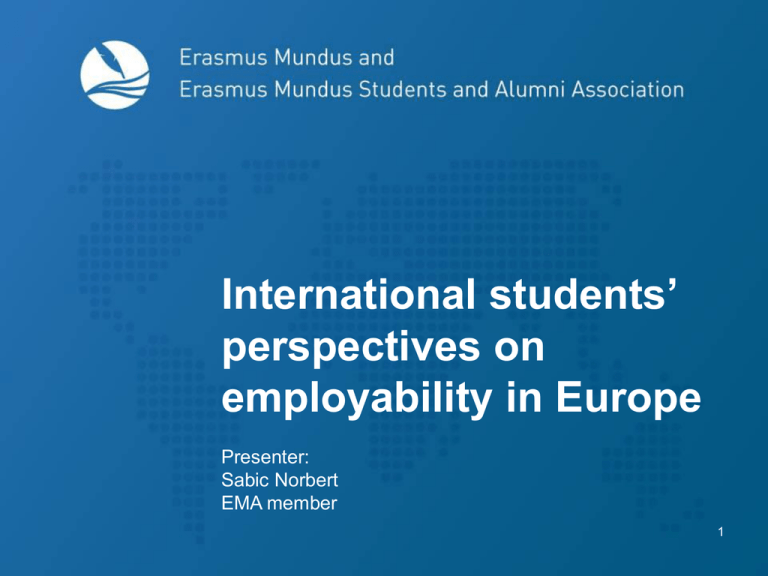
International students’ perspectives on employability in Europe Presenter: Sabic Norbert EMA member 1 Outline The Erasmus Mundus Programme and the Erasmus 10 Mundus Students and Alumni Association (EMA) 10 Employability survey (methodology, target group) 25 Results of the study 2 The Erasmus Mundus Programme 3 What is Erasmus Mundus The Programme „Erasmus Mundus is a co-operation and mobility programme in the field of higher education intended to promote the European Union as a centre of excellence in learning around the world.” (Interim Evaluation, 2007) Objectives: - To develop top-quality European masters courses. - To enhance the visibility and attractiveness of European higher education in third countries. EM masters courses cover all academic disciplines, although there is a majority of engineering and natural science courses. 4 What is Erasmus Mundus 2004-2008 2009-2013 Action 1: Masters courses Action 1: Programmes + scholarships Action 2: Scholarships Action 2: Partnerships Action 3: Partnerships Action 3: Attractiveness projects Action 4: Attractiveness projects 5 What is Erasmus Mundus 2004-2008 * (230 million EUR + 56,3 + 8,8) 2009-2013 ** (940 million EUR) Action 1: 80 EM master courses Action 1: - 138 EM master courses - 43 EM joint doctorates - 5.981 scholarships Action 2: 7.976 scholarships Action 2: 53 partnerships Action 3: 19 partnerships Action 3: 24 attractiveness projects Action 4: 23 attractiveness projects * Interim Evaluation of Erasmus Mundus - Executive Summary (2007) ** 2012 Selection results obtained from the website: http://eacea.ec.europa.eu/erasmus_mundus/funding/2012/selection/selection_call_42_11_en.php 6 EM scholarships by nationality * (2004 – 2012) 7 * Statistics (last updated on June 2012) obtained from: http://eacea.ec.europa.eu/erasmus_mundus/results_compendia/statistics_en.php The Erasmus Mundus Students and Alumni Association (EMA) 8 Erasmus Mundus Association (EMA) History • Founded: June 2006 by an initiative of the Directorate General for Culture and Education of the European Commission • Volunteer organisation •Over 7,500 EMA students & alumni as members 9 EMA - Activities Erasmus Mundus Graduate Impact Survey • Longitudinal study • Assessing the impact of Erasmus Mundus on career, attitude towards Europe and the EU, personality and social life • Results available under www.em-a.eu 10 Clusters within the Erasmus Mundus programme 11 Clusters Call for Tender EACEA/2009/05 • 5 clusters were set up in 2009 • • • • • • Sustainability Recognition of Degrees Employability Regional Cluster on Asia Thematic Cluster on climate change Clusters bring together beneficiaries, coordinators, students, alumni and other relevant stakeholders. 12 What is the added value of the Erasmus Mundus diploma in the labour market? 13 Employability Employability is understood as the combination of factors permitting access to work, to maintain it, and to progress in one’s career. HE institution Student Employer 14 Methodology Two different methodological approaches • Online survey among Erasmus Mundus students and graduates (student perspective) • Qualitative interviews with responsible coordinators of the Erasmus Mundus Masters Courses (institutional perspective) 15 Methodology Categories • • • • • • Professional orientation Networks (student/alumni) Competences Occupation of graduates Mobility Impact of EM on job search 16 The online survey (data owned by EACEA/EAC) 17 The online survey • The survey was carried out early 2011 • 107 questions • The estimated target group which was reached with the surveys is 18.766 students. Until March 2011 3.660 students responded to the surveys, and out of the total number 2.820 were considered as correctly filled out. • Current students / graduates ratio: 55% of the respondents graduated and 45% are still students 18 The online survey Graduate respondents • The biggest category were graduates who finished their studies in 2010. They made up 41% of our total graduate population. This fact is crucial, as it means that the largest group in the sample has been in the labour market for less • than one year. Another 45% of the graduate population finished studies in 2009 or 2008, i.e. they have spent at least one (or two) full years in the labour market. • 14% have spent more than three years in the labour market. 19 20 21 Professional orientation Summary • In all categories, at least 40% of the respondents rate the performance of the EMMC higher than a normal masters programme. The impact on personality development (71.5%) and the programme’s international reputation (61%) received the highest marks among the five categories. • About 60% plan to work directly after graduation, while about 30% want to continue with (PhD) studies. A good 10% are still undecided. • Almost 50% of the respondents had a permanent job before starting their EMMC. 22 23 24 26 Professional networks Summary • Students from Social Sciences, Business and Law seem best equipped with relevant professional contacts (47%), the fields Engineering, Manufacturing and Construction (35%) and Agriculture and Veterinary (32%) show the lowest affirmation rates with regard to accessibility to professional networks. • 20% of the students enrolled in an EMMC gain professional contacts that they consider relevant for their future career during their EM studies. 27 28 Competences • Professional expertise (mastery of own field or discipline, interdisciplinary know-how, analytical thinking, ability to acquire new knowledge) • Functional flexibility (ability to negotiate effectively, ability to perform well under pressure, ability to coordinate activities, ability to use time efficiently) • Mobilisation of human resources (ability to work productively with others, ability to mobilize the capacities of others, ability to clearly express your opinion, ability to assert your authority) • Innovation and knowledge management (ability to come up with new ideas and solutions, willingness to question your own and others' ideas, ability to present products, ideas or reports to an audience, ability to write reports, memos or documents) • International orientation (ability to write and speak in a foreign language, professional knowledge of other countries, knowledge/understanding of international differences in culture and society) 29 Competences Summary • Concerning employment in an international environment, Erasmus Mundus graduates are best prepared. – ability to write and speak in a foreign language – professional knowledge of other countries – knowledge/understanding of international differences in culture and society. • In terms of deficits, the mobilization of human resources, like mobilising others’ capacities, asserting one’s authority and negotiating effectively show lower rates. 30 31 32 Occupation Summary • About 50% of 2006 graduates have a permanent job after five years; only 3% are unemployed. • The highest percentage of employment (in the permanent term) can be found for Social Science, Business and Law (35%), while it is lowest in Agriculture and Veterinary (23%). • The level of job satisfaction is rated as high by 72% of all employed graduates; graduates of Health and Humanities and Welfare rate the highest and Arts graduates rate the lowest. 33 34 35 36 37 38 39 40 41 42 Mobility Summary • We find an equilibrium between a tendency to return to (or stay in) the home region (52%) and the tendency to remain in (or go to) another region (48%), the latter being overwhelmingly in the EU. • There is a notable mobility trend towards the European Union. • The main reasons for mobility among students/graduates are better job opportunities (career perspectives), while home and family issues act as the most important pull factor for the home countries. 43 44 45 Mobility For graduates from the European Union, Germany is the most preferred country to work in. With its first place ranking by 15% of graduates and top three ranking by almost 36% of graduates. Graduates from non-EU countries prefer to work in Germany, with 34% naming it among their top three and 13% as their first choice. 46 47 Mobility 48 Mobility 49 Conclusion 50 Conclusion #1 Health and Welfare discipline have the best expectations of finding high quality employment within our sample. On the contrary, graduates from expectations. Humanities and Arts have the worst Women have a lower score across all the categories of our index – particularly in permanent contracts and salary – except for job satisfaction, where they lie clearly ahead. 51 Conclusion #2 Youth from lower social backgrounds still have lower chances to access jobs and to attain higher positions in the labour market. Graduates from South-East Asia and from Africa achieve the highest scores who have successfully entered the labour market and, most notably, have attained higher positions. A degree in an Erasmus Mundus Masters Course is rewarded in the European labour market less compared to developing countries. 52 Thank you for your attention! 53
